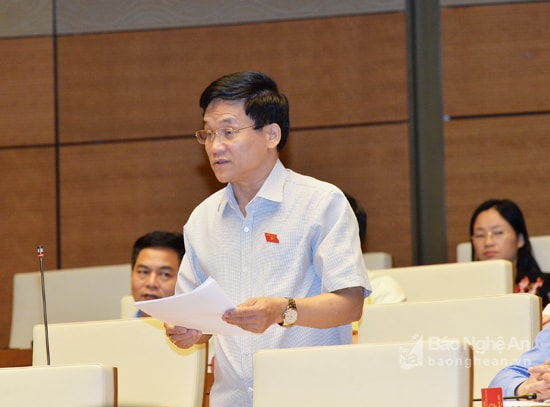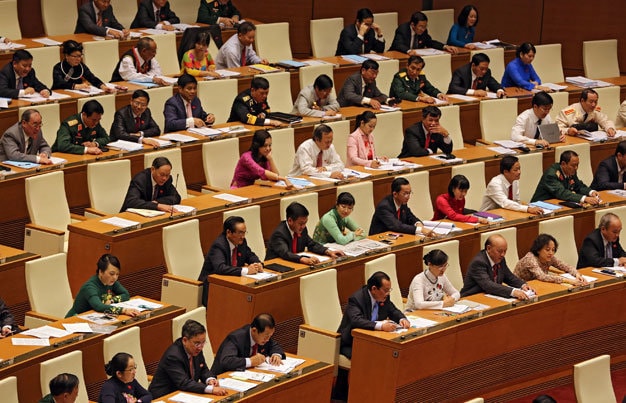It is necessary to supplement regulations on state management responsibilities for fisheries of the People's Committees at district and commune levels.
(Baonghean.vn) - Participating in the discussion session at the 3rd session hall of the 14th National Assembly on the Law on Fisheries (amended), on June 20, delegate Tran Van Mao - Deputy Head of the National Assembly delegation of Nghe An proposed clarifying the concept of aquatic resources, and specifying the responsibility for state management of fisheries of the People's Committees at district and commune levels.
| On June 20, continuing the 3rd session, the 14th National Assembly voted to pass the Law on State Compensation Liability (amended); the Law on Legal Aid (amended); the Law on amending and supplementing a number of articles of the Penal Code No. 100/2015/QH13; the Resolution on the implementation of the Penal Code; the Law on Security Guards; the Law on Management and Use of Weapons, Explosives and Support Tools and discussed in the hall the Draft Law on Fisheries (amended). |
According to delegate Tran Van Mao, the newly issued draft Law aims to establish a legal framework to regulate social relations in the fisheries sector, while improving the business environment in fisheries activities to restructure, develop value-added products, increase income, improve fishermen's lives, respond to climate change, contribute to protecting national sovereignty and security at sea and develop sustainable fisheries, meeting the requirements of international integration.
However, regarding the explanation of terms, delegate Tran Van Mao suggested that the draft Law should explain the concept of "natural water area" in Clause 1, Article 3, and whether artificial ponds, lakes, canals, and ditches are considered natural water areas or not, thereby clarifying the concept of aquatic resources.
 |
| Delegate Tran Van Mao - Deputy Head of the National Assembly Delegation of Nghe An Province spoke at the discussion session in the hall on the morning of June 20. Photo: Huyen Thuong |
Regarding state policies in fisheries activities, Clause 1, Article 6 lists activities that the State has investment and support policies for. However, according to delegate Tran Van Mao, the listing as in the draft is still widespread and does not reflect specific policies and support for fisheries activities. Therefore, it is recommended that the draft should have specific and clear regulations; breakthrough policy mechanisms and ensure resources for implementation to promote the development of the fisheries sector, and specific contents should be assigned to the Government according to practical requirements of each period to prescribe mechanisms and policies suitable for each specific fisheries activity.
Regarding state management responsibilities, delegate Tran Van Mao said that Article 7 only stipulates the state management responsibilities of the Government, ministries, branches and provincial People's Committees, but does not have specific regulations on the state management responsibilities of fisheries of district and commune People's Committees.
While local authorities play an important role in implementing legal documents, detecting and handling violations of aquatic resources protection, it is recommended to add state management responsibilities to district and commune levels to ensure the management role of grassroots levels in aquatic activities, delegate Tran Van Mao explained.
 |
| Delegates attending the 3rd session of the 14th National Assembly. Photo: Tuoi Tre |
Regarding prohibited acts in fisheries activities, delegate Tran Van Mao said that,The current situation in localities has been that coastal protection forest land has been encroached upon for shrimp farming, sea surface, marshes and swamps have been encroached upon for aquaculture, causing environmental pollution. Therefore, it is recommended that the draft Law include provisions prohibiting these contents. In addition, the draft Law should have strict regulations on exotic aquatic species to prevent the invasion of exotic species from the beginning, causing negative impacts on the environment and economic and social damage.
This delegate also said that to ensure strictness from the stages of farming, exploitation, processing, and preservation, it is necessary to amend the content of Clause 6, Article 8, which stipulates "Using banned chemicals, explosives, electricity, and destructive exploitation methods to exploit aquatic resources" to "Using drugs, additives, and chemicals on the banned list to raise, grow aquatic products, produce feed for aquaculture, grow aquatic products, process, preserve aquatic products, use explosives, electricity, and destructive exploitation methods to exploit aquatic resources".
Regarding community organizations managing fisheries activities, Clause 2, Article 11 stipulates that "the competent authority assigns the right to exploit aquatic resources to community organizations and is also the agency to revoke the operating regulations and management plans of community organizations when there are violations". According to delegate Tran Van Mao, the regulation of "revoking the regulations" is inappropriate. Because the operating regulations and management plans of community organizations are developed and implemented by that community organization when approved by a competent state agency, this is not a type of licensing, so the issue of revocation is inappropriate.
When there is a violation, it must be handled and there must be specific sanctions such as revoking the right to exploit aquatic resources for that community organization, not revoking the operating regulations and management plan of the community organization. Therefore, it is recommended that the drafting agency research and edit accordingly.
According to delegate Mao, the draft Law on Fisheries (amended) should have specific regulations on decentralization of management so that People's Committees at all levels can assign the right to exploit aquatic resources to community organizations within their management scope. Because if the regulations are general, it will be difficult to implement when the Law is issued without a guiding Decree.
PV-CTV






